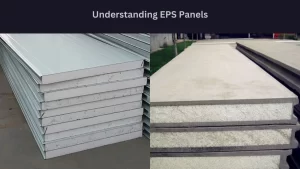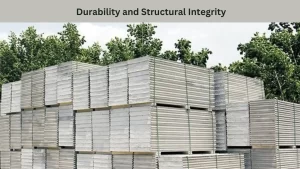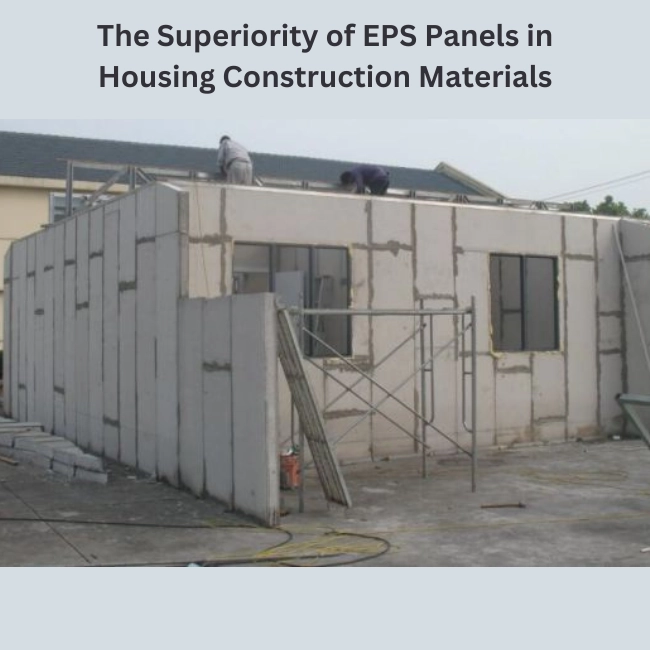In the ever-evolving world of construction, the quest for superior building materials has always been paramount. From ancient civilizations crafting structures from stone to the modern marvels of steel and glass, the materials we choose shape not only the aesthetic appeal of our buildings but also their longevity, efficiency, and environmental impact. In recent years, Expanded Polystyrene (EPS) panels have emerged as a revolutionary solution in housing construction, offering a myriad of benefits that elevate them above traditional alternatives. In this discourse, we delve into the superiority of EPS panels, exploring their attributes, advantages, and the transformative impact they wield in the construction industry.
Table of Contents
ToggleUnderstanding EPS Panels

EPS panels, also known as expanded polystyrene foam panels, are lightweight, versatile building materials manufactured from expanded polystyrene beads. These beads are expanded and fused together to form rigid panels with excellent insulation properties.
The manufacturing process entails the expansion of polystyrene beads through the use of steam. This expansion causes them to fuse together, forming a closed-cell foam structure. This structure imparts remarkable strength, insulation, and durability to EPS panels, making them an ideal choice for a wide array of construction applications.
The Advantages of EPS Panels
1. Superior Insulation Properties
One of the most significant advantages of EPS panels lies in their exceptional insulation capabilities. The closed-cell foam structure of EPS effectively traps air, creating a barrier that minimizes heat transfer. This thermal resistance significantly reduces energy consumption for heating and cooling, leading to lower utility bills and enhanced comfort within buildings. Moreover, EPS insulation maintains its effectiveness over time, ensuring long-term energy efficiency and sustainability.
2. Lightweight and Easy to Install
EPS panels are remarkably lightweight compared to traditional building materials such as concrete or brick. This characteristic not only facilitates easier transportation and handling but also simplifies the installation process, reducing labor costs and construction time. The lightweight nature of EPS panels also exerts less structural load on buildings, making them particularly suitable for multi-story constructions where weight considerations are paramount.
3. Durability and Structural Integrity

Despite their lightweight composition, EPS panels exhibit impressive durability and structural integrity. The closed-cell foam structure confers resistance to moisture, mold, and rot, ensuring longevity and minimizing maintenance requirements. Additionally, EPS panels possess excellent load-bearing capacity and seismic resilience, making them suitable for various construction applications, including walls, floors, and roofs. Their dimensional stability and resistance to warping or settling further enhance their suitability for building projects of all scales.
4. Versatility in Design and Application
EPS panels offer unparalleled versatility in design and application, enabling architects and builders to unleash their creativity and innovate in construction projects. These panels are available in a range of thicknesses and sizes, allowing for customization to meet specific project requirements. Furthermore, EPS panels can be easily cut and shaped on-site, facilitating intricate designs and architectural features. Whether used as insulation, cladding, or structural elements, EPS panels provide architects and builders with the flexibility to realize their vision and achieve desired aesthetics without compromising on performance.
5. Environmental Sustainability
In an era increasingly characterized by environmental consciousness, the sustainability of building materials is of paramount importance. EPS panels excel in this regard, offering a sustainable solution that aligns with green building practices. Expanded polystyrene is a recyclable material, and EPS panels can be manufactured with recycled content, further reducing their environmental footprint. Additionally, the energy efficiency afforded by EPS insulation contributes to reduced greenhouse gas emissions and promotes eco-friendly building practices.
Transforming the Construction Landscape
The superiority of EPS panels extends beyond their individual attributes; it encompasses their transformative impact on the construction landscape as a whole. By offering a holistic solution that combines energy efficiency, durability, and versatility, EPS panels empower architects, builders, and homeowners to construct buildings that are not only aesthetically pleasing but also sustainable, cost-effective, and resilient.
In residential construction, EPS panels have emerged as a game-changer, enabling the creation of energy-efficient homes that provide superior comfort and lower operating costs. From single-family dwellings to multi-unit developments, EPS panels offer a versatile and cost-effective solution that meets the evolving needs of homeowners and builders alike.
Moreover, in commercial and industrial construction, EPS panels are increasingly being embraced for their efficiency, durability, and adaptability. From warehouses and manufacturing facilities to office complexes and retail spaces, EPS panels offer a reliable solution that enhances building performance while reducing environmental impact and operating costs.
Conclusion
In conclusion, the superiority of EPS panels in housing construction materials is evident across various dimensions. From their exceptional insulation properties and durability to their versatility in design and application, EPS panels offer a compelling solution that addresses the evolving needs of the construction industry. As sustainability, energy efficiency, and cost-effectiveness continue to drive construction trends, EPS panels stand poised to lead the charge towards a more resilient, sustainable, and innovative built environment. By unlocking efficiency and durability, EPS panels pave the way for a brighter future in construction, where buildings are not only structures but also embodiments of sustainability and progress.
FAQs
1. How do EPS panels contribute to energy efficiency in housing construction?
EPS panels possess exceptional insulation properties, effectively minimizing heat transfer and reducing the need for heating and cooling systems. By creating a thermal barrier that maintains consistent indoor temperatures, EPS panels help lower energy consumption and utility bills, resulting in enhanced energy efficiency and reduced environmental impact.
2. Are EPS panels durable and suitable for long-term use in construction?
Yes, EPS panels are highly durable and offer excellent structural integrity. Their closed-cell foam structure provides resistance to moisture, mold, and rot, ensuring longevity and minimizing maintenance requirements. Additionally, EPS panels exhibit impressive load-bearing capacity and seismic resilience, making them suitable for various construction applications, including walls, floors, and roofs.
3. How versatile are EPS panels in design and application?
EPS panels are incredibly versatile, offering architects and builders the flexibility to innovate and customize designs to meet specific project requirements. Available in a range of thicknesses and sizes, EPS panels can be easily cut and shaped on-site, facilitating intricate designs and architectural features. Whether used as insulation, cladding, or structural elements, EPS panels enable creative expression without compromising on performance.
4. What is the environmental impact of using EPS panels in construction?
EPS panels offer a sustainable solution that aligns with green building practices. Expanded polystyrene is a recyclable material, and EPS panels can be manufactured with recycled content, reducing their environmental footprint. Additionally, the energy efficiency afforded by EPS insulation contributes to reduced greenhouse gas emissions and promotes eco-friendly building practices, making EPS panels an environmentally responsible choice for construction projects.
Also, read



